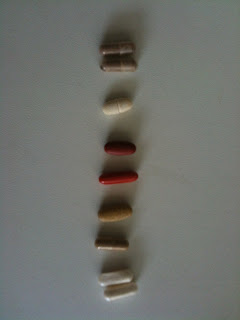High testosterone levels in women are one of the leading causes of a range of conditions - the most prevalent and commonly diagnosed is PCOS. We have a large number of women attend our clinic with a diagnosis of PCOS, majority of them have never been told about the possibilities of what might cause their condition, that their condition is not necessarily permanent, and that there are things they can do on a
daily basis that can change the course of their disease and improve their symptoms.
A range of underlying abnormalities lead to PCOS, infertility, abnormal menstrual cycles, hormonal acne, including:
- insulin resistance, often secondary to obesity
- elevated hormonal androgens, primarily testosterone
- lowered progesterone levels causing erratic ovulation.
Signs of high tesosterone in women:
- darker hair growth on the body
- hair growth on face and bellow the belly button
- acne that appears on the face the same time every month
High testosterone is commonly found in the average city-dwelling under-the-pump working woman.
Treatment for the symptoms of high testosterone can vary according to the problem you report to your doctor. Treatments can range from:
- oral contraceptive medications to control hormonal acne
- clomiphene tablets to aid in ovulation for fertility issues/PCOS
Clomiphene tablets maybe combined with steroid tablets to suppress androgen production - most often in women who are wanting to conceive. However this does not address the underlying issue, and is unfortunately associated with an increased rate of miscarriage if conception does occur. Forcing ovulation with clomiphene is not useful for all women, and can cause damage to your fertility if it is not suitable for you.
To check your testosterone levels (and other hormones) you must see the free amount of hormone circulating in your body, this is done via saliva testing. The causes of elevated testosterone are:
- A high sugar and carbohydrate diet
- Ovarian and adrenal dysfunction
- Your body converts too much hormone precursors into testosterone (excess aromatisation)
- Impaired liver detoxification function
- Supplementation with testosterone
- Low sex hormone binding globulin (SHBG)
- Increased stress
- Insulin resistance
- Low thyroid function (TSH should be between 0.5 – 2)
Obesity and PCOS
Women who are obese may be predisposed to PCOS and elevated testosterone. Fatty tissue produces oestrogen and stores oestrogen, leading to hormonal imbalances that affect the development and ripening of immature follicles within the ovary. Fatty tissue also secretes excess androgens leading to many of the masculine signs and symptoms of PCOS (eg facial hair). Thus weight loss and control for those with weight issues is a must, especially if weight is carried around the abdomen.
Researchers describe ‘belly fat’ an active "organ", one that churns out hormones and inflammatory substances. ‘Abdominal fat is thought to break down easily into fatty acids, which flow directly into the liver and into muscle’ according to Lewis Kuller MD DPH, professor and past chair of epidemiology at the University of Pittsburgh School of Public Health.
The increase in hormone production and inflammatory substances produced in the abdominal fat lead to overworking the liver and reducing the effectiveness of hormonal clearance. In a cascade of endocrine effects, insulin becomes less effective in controlling blood sugar, insulin resistance can sets in, and here we have yet another cause of PCOS (see earlier post on PCOS).
Blood Sugar Levels and Testosterone
Type II diabetes
OR high sugar intake in diet causes insulin resistance and is a major cause of PCOS. Type II diabetes is controlled with drugs like Metformin, or as studies have shown, a low carbohydrate combined with exercise is as effective but without the side effects of medication. A low GI sugar free diet is a must for anyone with PCOS symptoms. The close relationship between insulin resistance and diet control is a number one priority for anyone wanting to cure themselves of high testosterone or PCOS. Insulin up-regulates the production of testosterone, and high blood sugar levels present in "
carbohydrate specialists" who are eating muesli for breakfast, sandwiches for lunch, fruit for snacks and pasta for dinner, are a big part of the problem for most women with hormonal imbalance.
Other factors that impact on insulin are low levels of magnesium, high carbohydrate and sugar intake, coffee and smoking.
The role of the liver
Dysfunctional liver detoxification pathways also contribute to hormonal imbalances in women, leading to acne, anovulation and PCOS. The liver is responsible for clearing built up hormones in the body, especially via the sulphation and glucoronidation pathways. When the liver is overloaded with the use of alcohol, caffeine, pharmaceutical or non-pharmaceutical drugs, the clearance of elevated stress hormone, environmental toxins, cleaning agents, aerosolized paints, thinners, or under attack by viral hepatitis, then the liver is unable to clear hormones from the blood stream. Estrogen and testosterone levels then build up.
The treatment for a stressed liver is stress reduction, gut detox and liver detox. Look over the blog on stress (http://bit.ly/lxCh9o) to see that stress is not just physiological, and all stressors must be removed or reduced. Speak to a healthcare practitioner to guide you through a gut and liver detox (which may also aid in weight loss). Bacterial, yeast build up or parasites in the bowel prevent toxin and hormonal clearance from the body. The gut should always be checked for the presence of any of these problems and be addressed before commencing a liver detox, otherwise toxins and hormones are unable to be effectively cleared from the body and re-enter circulation.
Other Causes of PCOS
An Adrenal gland dysfunction, Chronic high stress levels or an adrenal tumor – Imbalanced levels of the stress hormone cortisol and sex hormone DHEA, both secreted from the adrenal glands create stress in the body which impacts on ovarian function, which causes PCOS. Your diurnal variation of cortisol throughout the day can be tested at our clinic via a saliva test. Contact us for a referral for a saliva hormone testing kit.
Stress and PCOS
Stress, perhaps you may need to think about that one again…..Stress can not only cause ovarian dysfunction but cortisol can suck up our levels of progesterone, as progesterone is a precursor to make cortisol. PCOS and the resulting lack of ovulation can be due to a lack of progesterone.
Low levels of Progesterone
The lack of progesterone is detected by the hypothalamus, which continues to try to stimulate the ovary by increasing its production of GnRH, which increases the pituitary production of FSH and LH. This stimulates the ovary to make more estrogen and androgens, which stimulates more follicles toward maturation. If these additional follicles are also unable to produce a matured ovum or make progesterone, the menstrual cycle is dominated by increased estrogen and androgen production without progesterone. This is the fundamental abnormality that creates PCOS. (Ref 5)
Progesterone can be supplemented with herbs and natural progesterone cream which we can write you a referral to get. Reduction of stress is paramount.
Low Sex Hormone Binding globulin
SHBG Sex hormone-binding globulin (SHBG) or sex steroid-binding globulin (SSBG) binds to sex hormones, mostly to testosterone and estradiol. These hormones circulate in the bloodstream, bound mostly to SHBG and only a small fraction is unbound, or "free," and thus biologically active. Thus, SHBG inhibits the function of these hormones. (Ref 6 )
Causes of Low SHBG are: Use of the Oral Contraceptive Pill – OCP, Excess protein, alcohol, thyroid disease and excess soy consumption. (Ref 7)
Androstenediol can be taken to increase testosterone, as it converts directly into testosterone, and is used mostly by weight lifters to build strength and increase immunity.
Low thyroid Function
A poorly functioning thyroid gland affects adrenal gland function, and the liver's ability to detoxify testosterone via the sulphation and glucoronidation pathways. This leads to higher testosterone levels and lower SHBG, see above.
Pituitary dysfunction
This will lead to an abnormal secretion of other menstrual related hormones, causing anovulation, and a build up of follicles within the ovaries. This is the last call, and should be checked if all else fails.
Low levels of Magnesium
Recently, there are reports about correlations between insulin resistance and deficiency of magnesium. Some of mechanisms is when there is magnesium deficiency, magnesium fails to activate tyrosine kinase of insulin receptor and hyperinsulinemia stimulates magnesium excretion. It is expected that the exact mechanisms between insulin resistance, metabolic syndrome and magnesium metabolism. (Ref 8)
Elevated Boron levels in the blood
Unknown to the vegetable of fruit consumer, toxic Boron levels are in soils derived from marine evaporites and marine argillaceous sediment, which can carry thourgh into the food we eat, unless eating organically. The most important source is irrigation water, but others include wastes from surface mining, fly ash, and industrial chemicals (ref 9). Hair levels of iron, boron, calcium, and zinc are often concomitantly elevated with lead burden. Lead exposure includes welding, old leaded paint (chips/dust), drinking water, some fertilizers, industrial pollution, lead-glazed pottery, and newsprint. (Ref 10)
Boron's link with high testosterone is via its effects on decreasing serum magnesium serum which can impact on insulin resistance (Ref 7).
Elevated Copper
Copper reduces adrenal and thyroid function, see above.
Medical conditions that may be associated with excess copper include: biliary obstruction (reduced ability to excrete Cu), liver disease (hepatitis or cirrhosis), and renal dysfunction. Symptoms associated with excess Cu accumulation are muscle and joint pain, depression, irritability, tremor, hemolytic anemia, learning disabilities, and behavioral disorders. See Dr Kaslow webpage on copper-zinc imbalances.
However, it is important first to rule out contamination from hair products and dyes, bleaches, swimming pool/hot tub water, and washing hair in acidic water carried through copper pipes. In the case of contamination from hair preparations, other elements (aluminum, silver, nickel, titanium) are usually also elevated.
Sources of excessive copper include contaminated food or drinking water, excessive Cu supplementation, and occupational or environmental exposures. Insufficient intake of competitively absorbed elements such as zinc or molybdenum can lead to, or worsen Cu excess. (Ref 11)
Copper and Boron may be tested via hair mineral analysis, with a referral from our clinic.
Aromatises Inhibitors
Aromatise inhibitors (AIs) are a class of drugs used in the treatment of breast cancer, ovarian cancer and in post menopausal women
Anti-estrogen aromatase inhibitors offer their anti estrogenic effect by blocking the enzyme responsible for synthesizing or converting testosterone into estrogen via a process called aromatization. Thus their effect is to decrease estrogen and increase free testosterone and insulin growth factor levels in the body.
I think I might have a problem with my testosterone levels
Although there are many causes for elevated testosterone, we can usually determine which cause is related to your symptoms quite quickly and effectively. At the Discover clinic we use clinically proven herbal and nutritional supplements to directly bring down testosterone levels, regulate insulin levels, treat thyroid imbalances, increase liver detoxification pathways and help clear heavy metal build up. With the correct treatment, and sound advice on diet PCOS can be very well treated. PCOS is definitely not a life sentence.
References
4. 2007, ‘Risks of Belly Fat’, WebMD, viewed 7/7/11 - www.webmd.com/diet/risks-weight-around-waist-7/belly-risks?page=2
5. PCOS and Infertility viewed on the 27/10/11 at http://www.ovarian-cysts-pcos.com/progesterone.html
6. Wikipedia, viewed on the 27/10/11 at http://en.wikipedia.org/wiki/Sex_hormone-binding_globulin
7. ARL pathology, Healthscope Manual, pg 96
8. 2005, Higashiura K, ‘Magnesium and insulin resistance’, Clin Calcium. PUBMED, 2005 Feb;15(2):251-4. [Article in Japanese] Second Department of Internal Medicine, Sapporo Medical University School of Medicine. PMID:15692165, [PubMed - indexed for MEDLINE]
9. Ross O, 1997, Boron toxicity, Plant and Soil, Chapter 12, 193: 181–198, CSIRO Land and Water, P.M.B., P.O. Aitkenvale, QLD 4814, Australia_, 2Water Management Research, Kluwer Academic Publishers. Printed in the Netherlands.
10. Jeremy E. Kaslow, MD, FACP, FACAAI Physician and Surgeon, Lead, Found on the 24/10/11 on the Dr.Kaslow.com site - http://www.drkaslow.com/html/hair_analysis.html
11. Viewed on the 27/10 11 at -http://www.drkaslow.com/html/hair_analysis.html






